

Lana Del Rey - Body Electric (STUDIO VERSION) Breaking Bad - When I Heard the Learn'd Astronomer. Breaking Bad - W. W. Leaves of Glass by Kera Bolonik. Had Walt Whitman, an occasional proponent of Prohibition, lived today, he might have been horrified to discover that he in any way inspired a TV series about a murderous drug lord named Walter White.

And stunned (though perhaps pleased) to find his magnum opus employed as the smoking gun leading to the man’s undoing. But after a smattering of Whitman references throughout its four and a half seasons, AMC’s Breaking Bad—which is wrapping up its final chapter beginning August 11—has done just that, drawing an unlikely parallel between the two men who share a monogram (W.W.) and, for all intents and purposes, a name. So how does Walter White compare to Walt Whitman? And what cynical commentary on our times, on humanity, does series creator Vince Gilligan make with this subversive pairing? When we first meet White, he is a dejected, emasculated high school science teacher.
Walter is intrigued but wary of Gale from the start. This poem is a portrait of the Walter we’ve come to know. Walt Whitman, Emily Dickinson and the War That Changed Poetry, Forever. Watch "The Poetry of Perception": Harvard Animates Walt Whitman, Emily Dickinson & William Carlos Williams. Two years ago, a series of animated science videos began to pop up on a Vimeo account called HarvardX Neuroscience.
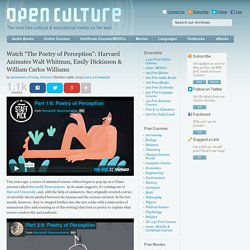
Song of Myself Section 15. Song of Myself Study Text. Walt Whitman - Song of Myself and Other Poems : Alan Davis Drake. Walt Whitman and Leaves of Grass 1. Leaves of Grass. Walt Whitman conceptualized his poetic project in terms of language experimentation.
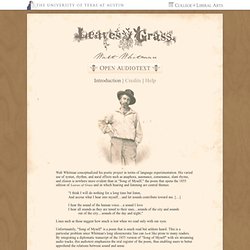
His varied use of syntax, rhythm, and aural effects such as anaphora, assonance, consonance, slant rhyme, and elision is nowhere more evident than in "Song of Myself," the poem that opens the 1855 edition of Leaves of Grass and in which hearing and listening are central themes: "I think I will do nothing for a long time but listen, And accrue what I hear into myself....and let sounds contribute toward me. […]I hear the sound of the human voice....a sound I love I hear all sounds as they are tuned to their uses....sounds of the city and sounds out of the city....sounds of the day and night;" Lines such as these suggest how much is lost when we read only with our eyes.
Unfortunately, "Song of Myself" is a poem that is much read but seldom heard. This is a particular problem since Whitman's long idiosyncratic line can look like prose to many readers. Leaves of Grass : The Fresh Air Interview: Poet Robert Hass, On Whitman's 'Song Of Myself' Revisiting Bruce Springsteen's Barbaric Yawp, via Louis CK - Sean Murphy. This righteous, eloquent and not uncomplicated rant by National Treasure Louis CK has, rightly, been getting a lot of buzz this week.
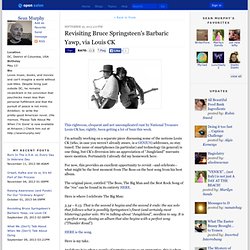
I’m actually working on a separate piece discussing some of the notions Louis CK (who, in case you weren’t already aware, is a GENIUS) addresses, so stay tuned. The issue of smartphones (in particular) and technology (in general) is one thing, but CK’s diversion into an appreciation of “Jungleland” warrants more mention. Fortunately I already did my homework here. For now, this provides an excellent opportunity to revisit –and celebrate– what might be the best moment from The Boss on the best song from his best album. The original piece, entitled “The Boss, The Big Man and the Best Rock Song of the ’70s” can be found in its entirety HERE.
Here is where I celebrate The Big Man: 3.54 – 6.13. HERE is the song. Here is my take. Which brings us back to the Big Man. Nicky Tiso reads "Long, Too Long America" by Walt Whitman via human microphone. From "Song of Myself" (Favorite Poem Project) "Leaves of Grass" by Walt Whitman (poetry reading) Literary Timeline. American Experience . Walt Whitman. U. S. editions of Leaves of Grass - The Walt Whitman Archive. The Walt Whitman Archive. Walt Whitman Archive - Walt Whitman's Correspondence - The Walt Whitman Archive. In this section, the Whitman Archive offers a growing amount of correspondence.
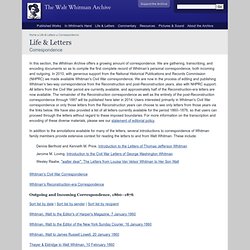
We are gathering, transcribing, and encoding documents so as to compile the first complete record of Whitman's personal correspondence, both incoming and outgoing. In 2010, with generous support from the National Historical Publications and Records Commission (NHPRC) we made available Whitman's Civil War correspondence. We are now in the process of editing and publishing Whitman's two-way correspondence from the Reconstruction and post-Reconstruction years, also with NHPRC support.
All letters from the Civil War period are currently available, and approximately half of the Reconstruction-era letters are now available. Whitman and Emerson. This section of the site includes two letters, one by Emerson and one by Whitman that became a part of the second edition of Leaves of Grass.
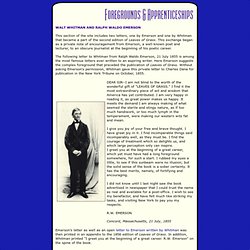
This exchange began as a private note of encouragement from Emerson, a well-known poet and lecturer, to an obscure journalist at the beginning of his poetic career. The following letter to Whitman from Ralph Waldo Emerson, 21 July 1855 is among the most famous letters ever written to an aspiring writer. Here Emerson suggests the complex foreground that preceded the publication of Leaves of Grass. Without asking Emerson's permission, Whitman gave this private letter to Charles Dana for publication in the New York Tribune on October, 1855.